LISTEN IN APPLE PODCASTS | LISTEN IN SPOTIFY | LISTEN IN STITCHER
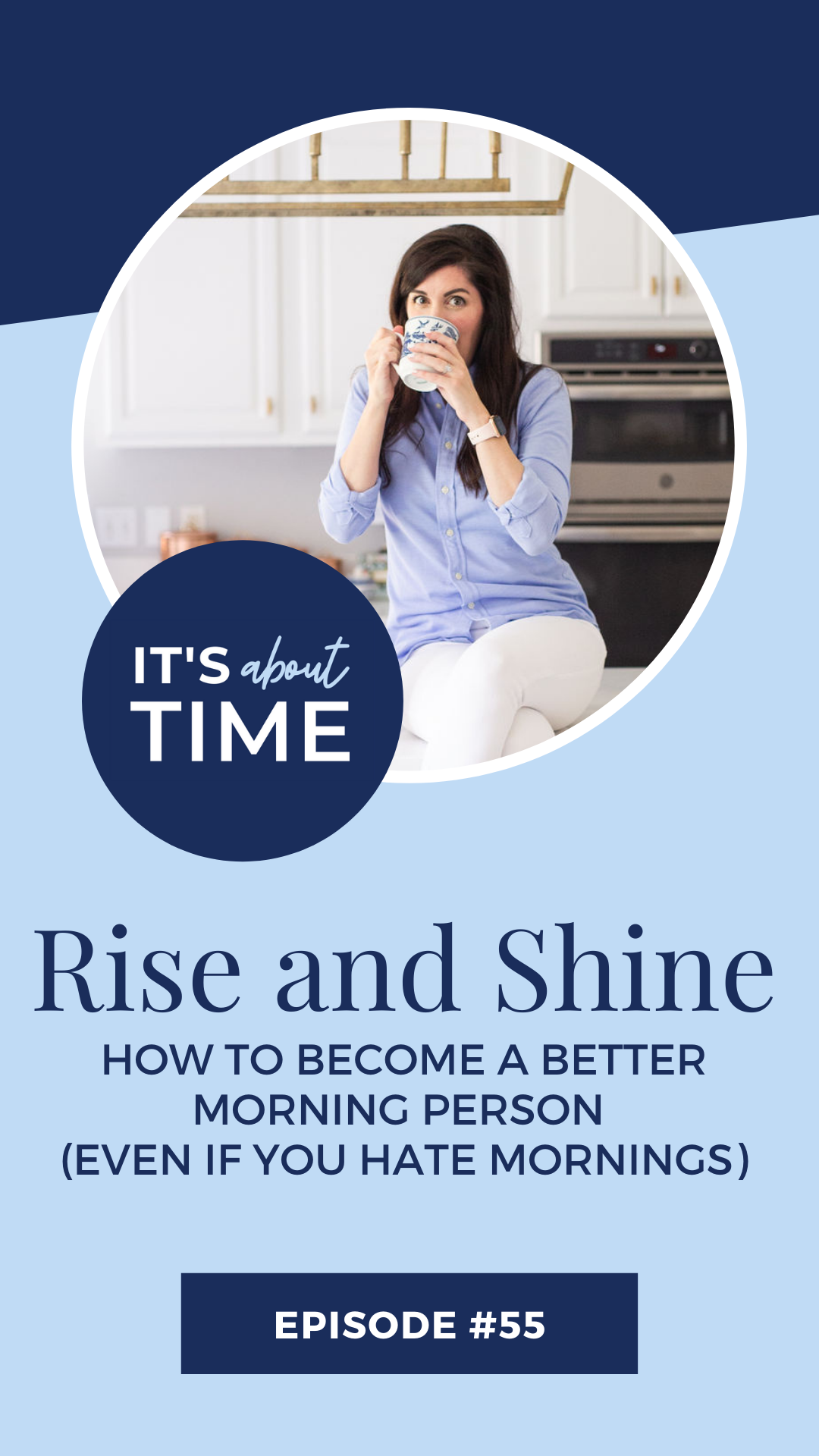
Ahhh mornings. The sound of birds chirping as the sun gently rises over the horizon. The smell of coffee brewing in the kitchen, and the grumblings of cranky night owls everywhere who hate mornings.
Episode 55 of It’s About Time is all about the early bird hours of the day.
I’m talking all about mornings – well – mostly diving into answers to a super common question that comes my way:
How do I become a better morning person?
If you struggle to drag yourself out of bed on the daily, or you’re falling asleep during your morning status meeting, or even if you’re just looking for a little more pep in your AM step, this episode is just for you.
And if you’re tuning in and you’re thinking, but Anna – I have no trouble with mornings. I LOVE waking up at the crack of dawn – just you wait. Your mornings are about to get EVEN better.
In this episode, I’m pulling back the covers on
-
Whether it’s even possible to become a morning person
-
The three biological chronotypes – which is a fancy way of saying – morning person, night person or somewhere in the middle – and how to figure out which one you are
-
Plus – simple tips that you can start implementing TONIGHT to help you have a better morning tomorrow.
And this is coming from a lifelong NOT morning person who has somehow managed to make getting up at 5:05 a regular thing.
And yes, you’ll also hear the reason why I set my alarm for 5:05 instead of 5 on the dot.
What exactly does it take to become a morning person?
Is it even possible to become a morning person if you’ve always been a night owl?
If I’m already an early bird – how can I make my mornings even better?
All questions that I’ve gotten in the past few months from friends, in my instagram DMs and from members of the It’s About Time Academy.
Me personally? I’ve always thought of myself as a night owl – but I’m finding more and more lately that waking up before the sun comes up isn’t so bad after all.

So where do we begin – First off we’re going to talk about whether it’s possible to become a morning person, or if it will always be a struggle for some of us.
That will take us to a dive into biological chronotypes – and discovering which chronotype we are. And by the way, biological chronotype is just a sciency way of saying whether you’re a natural morning person, night person or somewhere in between. Yep – turns out, there’s more than just morning larks and night owls – there’s a third bird – and you just might be in that flock with me.
Then – once we have an idea of which feathered friend we are, we’ll look at 4 simple steps that anyone – regardless of type – can take to make mornings better than ever. Spoiler alert – good mornings always start the night before.
Alright. Ready? Here we go!
how do I become a morning person?
Is it possible to become a morning person?
Well… yes! And also… sort of no. And it also kind of depends on how old you are. And here’s why…
You know how sometimes during your day, you feel totally on point.
Awake.
Refreshed.
And then sometimes you’re totally dragging – usually after lunch, that afternoon lull where you feel kinda foggy. Sometimes that afternoon lull can feel totally frustrating – but I want you to know that you’re not alone in feeling these ups and downs throughout the day.
They’re totally normal.
The Three Energy Phases
You see… We’re all biologically wired to experience energy peaks and valleys throughout the day. In fact, there are three different energy phases that we all experience each day
-
The Peak.
-
The Trough
-
The rebound.
The peak is your highest energy point in the day. This is when you feel amazing, this is your best time for focused work. For deep work that requires concentration.
The trough is your lowest energy point in the day. This is when you’re totally dragging and you’re craving a coffee, a nap – or both.
The rebound is another high energy point, but it’s not quite as high as your peak. You’re feeling pretty good – you’re able to get stuff done and you’re able to focus.
But here’s the crazy thing – even though we all have these three energy phases every day – we don’t all experience them in the same order, or at the same times of day!
And that’s where your biological chronotype comes in – which, as I said before is a fancy way of saying whether you’re a chirpy morning lark ready to sing with the sunrise, or a night owl who’d rather pull the covers over their head and smash the snooze button for the fifth time.
The Three biological chronotypes
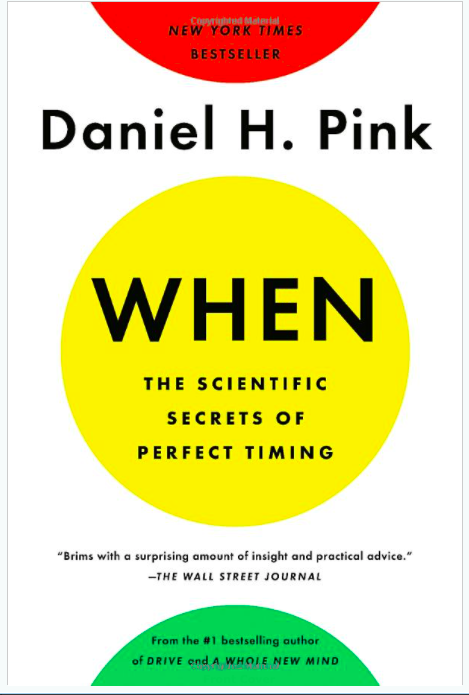
And while we usually group ourselves in one of two feathered flocks, there are actually THREE biological chronotypes: morning larks, night owls… and third birds.
Yes, third birds! That’s a thing! So if you’ve ever felt like you’re not quite a morning person, but you’re not really a night owl either… you might be a third bird – just like me.
I learned about these three chronotypes reading Daniel Pink’s book When: The Scientific Secrets of Perfect Timing. During my group coaching program this past summer, Take Back Your Life – 8 Weeks from Chaos to Clarity – we spent a week understanding our chronotype and learning how to use it to our advantage throughout the day.
So let me tell you a little bit about each of these three birds so you can get an idea of where you land.
Morning Larks
Ok – we’ll start with Morning Larks
Morning Larks – no surprise – feel their best in the early morning hours.
They experience the three phases of energy in this order:
Peak, Trough and Rebound.
So they’re at their Peak in the early morning hours – usually around 6, 7 or 8. Then they have their lowest energy point in the afternoon. And finally, in the early evening they feel a second wind – another boost of natural energy with their rebound.
Larks are our morning people. They’re early to bed and early to rise. Remember how I mentioned earlier that you can become a morning person? Sort of?
What’s interesting about chronotypes is that your bird can change throughout your life.
Most children, from toddlers to pre-teens are larks. Any moms listening whose kids have bounded into their room at 5AM on a Saturday morning already know this.
More women are larks than men, and many adults over 60 become larks, even if they experienced different patterns during other parts of life. Also interesting? Statistics show that people with fall or winter birthdays tend to be larks.
Here are a few fun personality traits most often associated with Larks. And remember – these aren’t hard rules, just common findings. There are always exceptions to the rule.
Larks are often introverted and conscientious. Agreeable and persistent. They’re known for being emotionally stable, and for taking initiative. They’re also very likely to make plans for the future.
Night Owls
So let’s head to the opposite end of the spectrum and meet the Owls.
Owls are naturally late to bed, and naturally late to rise.
Remember how larks experience day in this order? Peak, Trough and Rebound?
For owls, it’s the exact opposite.
Owls actually start their day in the Rebound phase. So in the morning hours, owls can feel okay – but they’re definitely NOT at their best. Then in the afternoon, just like the Morning Larks, they dip even LOWER into the trough. And then finally in the evening, they totally come alive in their peak.
So again Morning Larks are Peak, Trough Rebound, but Owls are Rebound, Trough, Peak.
Remember those morning lark kiddos up at the crack of dawn eating candy in the pantry and ordering the Trolls movie from Amazon Prime?
Once those morning lark children make the transition into their teenage years, they become more owlish – and that owlishness typically lasts through their early 20s. So if you were a total night owl in college, getting your stamp at the bar no earlier than 11 – but now you can’t keep your eyes open past 9PM – that’s why! Your owl days just might be behind you.
More men than women tend to be natural owls, and owls are typically born in the spring and summer months.
One very interesting thing to note is that Owls make up only one fourth of the population, so they’re a lot less common than you might think. Look at you, you rare birds, you!
Here are few common personality traits of the Owl. They’re known for being open and extroverted, impulsive thrill seekers. They’re typically more creative, have a superior working memory, plus they’re generally hilarious.
Third Birds
Ok – so we’ve talked Morning Larks, and we’ve talked Night Owls – but what about those Third Birds?
Chances are, you are a third bird.
Call this a mid-morning pigeon, a flamingo ready for brunch, a midday hawk – whatever you want, but Third Birds are those of us who don’t fall neatly into the lark or the owl category. Third birds are the most common type and make up 60-80% of the population, so like I said – there’s a pretty good chance you’re a third bird.
Like the morning lark, Third Birds experience their daily energy phases in this order: Peak, Trough and Rebound, but their peak and rebound times are pushed back a bit. Think midmorning peak – instead of early morning, and early to mid-evening rebound.
And if you’re curious about Third Bird personality traits, they’re a bit more unpredictable than the Morning Lark and the Night Owl, so consider a Third Bird personality a mix of both.
but Is it possible to become a morning person?
So going back to the original question – is it possible to become a morning person. Biologically – some of us are just born that way. And then we can lean Morning Lark depending on our stage of life, when we’re children or senior adults.
One thing I truly hope is that by understanding that there are three distinct time types, that you’re able to give yourself a little grace if mornings aren’t the easiest for you.
And there’s no doubt that the working world rewards the early bird tendencies of morning larks. Traditional business hours and school start times are built for larks and are pretty doable for third birds, but are often a struggle for owls.
And if you have a child, coworker, significant other, or someone else in your life who you can totally spot as being a different bird from you – I hope that you’re able to be understanding with them, too.
I like to believe that most of us really are trying our best, and working with what we’ve got – in this case our biological chronotype.
And for all of my owls who are listening – yes – it IS possible for you to have good mornings, too.
You have a choice – you can use your Owl-ness as an excuse “I can’t do mornings, because I’m an owl.” or you can choose to find a way to make mornings work for you.
HOW TO BE BETTER IN THE MORNING
So how can we make the most of mornings regardless of our feathered time type?
First, we’re going to start with why.
Then, we’re going to make being “good at mornings” a part of our identity.
Finally, we’ll start our good morning before we turn off the light the night before.
START WITH WHY
First – Starting with why.
Anytime you set out to do anything, it’s critical to articulate WHY you want to do that thing in the first place.
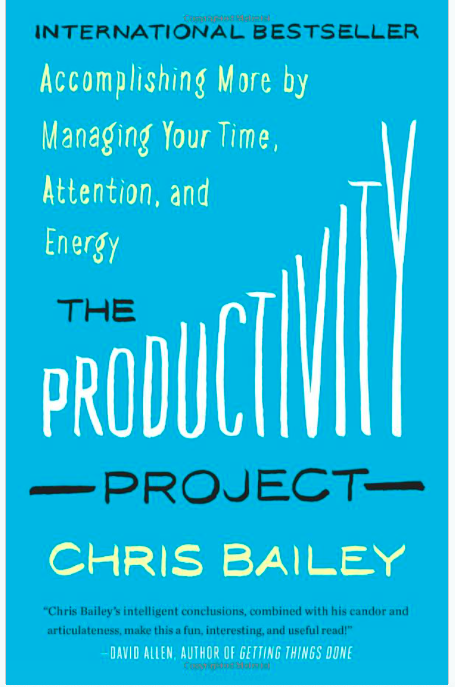
In his book The Productivity Project, Chris Bailey tested out dozens upon dozens of different productivity hacks over the course of a year to figure out what worked and what didn’t. After reading that tons of the most productive people – from CEOs and Entrepreneurs to Scientists and Artists – wake up at 5AM, he set out to do the same.
He found that, for him, waking up at 5AM was totally miserable because he didn’t really have a good reason for getting up that early. He had evening hours pretty open and available to him, and there really was no good reason for him to get up that early.
For me, on the other hand, and I’m sure for many of you – it’s a much different story. As a mom to a toddler with a strict deadline for daycare pickup, I just don’t have the option to blow past 4:30 and keep working. And once I shut down for the day, my evening hours are totally spoken for until around 7:30 with dinner prep, bath time, and bedtime routine.
Maybe you don’t have kids at home like I do, but you spend your evening hours on volunteer activities, nonprofit meetings or other things and you want to take advantage of those early morning hours for things like working out, personal development or meditation.
If you want to incorporate more intentional personal development into your mornings, Back in Episode 19, I dedicated an entire episode to designing a next level morning routine that includes meditation, affirmations and other ways to start your day.
Regardless of your reason, before you set out to become a better morning person, your first step is to articulate your why. If you don’t have a clear purpose in mind for getting up, and you know that you struggle to climb out of the bed, it’s going to be nearly impossible to pull yourself out of bed for no good reason.
So ask yourself Why? Why do I want to be a better morning person? And then once you have that first answer. Maybe it’s to work out, maybe it’s to get in an hour of work, maybe it’s just to have some stillness before your family wakes up – once you have your first answer, ask yourself why again. Why do you want to work out? Why do you want to get in an extra hour of work? Why do you want some stillness before your family wakes up?
What would that give you? Would working out enable you to feel more confident in your skin? To prove to yourself that you can run a marathon? Does that extra hour of work get you closer to a promotion or the next level in your business journey? Does that stillness enable you to step into your day feeling calm, prepared and peaceful? Is that your time in scripture or a devotional that strengthens your relationship with God?
A few weeks ago in Episode 51, I shared that a typical work week for me only has room for about 20-25 hours of work – I can eek out 30-35 if I skip all of my workouts and go back to work after Camilla goes down for the night – but I need exercise, and I need time to unwind in the evenings in order to bring my best self to the next day.
Tune In to Episode 51: Own It: Time Management When Your Time is Not Your Own
Right around the time I published Episode 51, I started experimenting with waking up earlier a few days a week to get in some writing during the early morning hours.
My big why for waking up before the sunrise? I want to write and publish a book that makes time management more accessible, easier to understand and take action. And I know based on my research that there are certain things that need to happen before I am in a good place to even start that book proposal. So while the exact work I’m doing might change on a morning by morning basis – it all ties into getting me one step closer to a book proposal. So when my alarm goes off at 5:05 – I know exactly why I’m getting up and out of bed. So I can write and publish a book that will help women like you live life with less overwhelm and more intention.
And if you’re curious – Why 5:05? Why not 5AM or 5:15? That seems weird. Well – maybe so. Here’s my weird Anna logic. 5:00 on the dot is just ONE minute away from 4:59. 4:59 just seems SO early. Something about 5:05 just feels more doable. Like it’s far enough away from the 4:00 hour to feel realistic.
Look – It doesn’t have to make sense… it just has to work. So – find what works for you.
Before I move on to step two – want you to ask the question right now. What’s your reason? What’s your why for having better mornings?
Got it?
Ok – Good.
TIE MORNINGS TO YOUR IDENTITY
Once you know your why for waking up early and becoming a better morning person, the second step is to tie mornings to your identity.
If you’ve been listening to It’s About Time for a while, you’ve probably heard me mention James Clear’s book Atomic Habits. In this book, one of Clear’s first steps for starting any new habit is to make it a part of who you are.
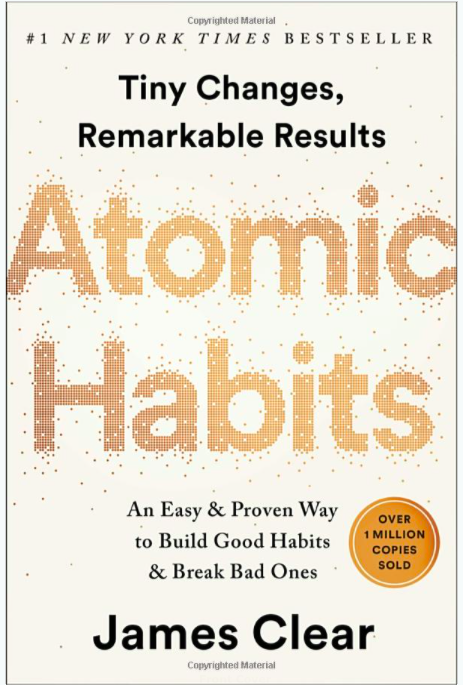
The words we use to describe ourselves and our internal self-talk is powerful, y’all.
And if you tell yourself “I suck at mornings.” or “I just don’t do mornings.” That’s exactly what’s going to happen. You’ll act in a way that is in line with your beliefs and your statements.
Negative self talk – whether about your ability to do mornings well or something completely different, has a lot of – you guessed it – negative consequences. Among other it can limit our ability to see opportunities, increases perfectionism, can lead to feelings of depression, insecurity, and a heightened sense of stress.
So, now that you know your WHY for being a better morning person, flip the script on any morning negativity you’ve been holding on to. Start to bring awareness to those moments when you catch yourself thinking, “Ugh I hate mornings” or “Ugh, I can’t get up early” and replace it with something neutral or positive. “I can do mornings.” or “I can get out of bed because of my why.”
And like James Clear recommends for starting new habits, tell yourself “I am someone who is good at mornings.”
Before long, you’ll begin to act accordingly. Your actions will align with your words and your thoughts. You’ll make tiny decisions that begin to add up to morning success. Those tiny decisions bring us to Step three – winning your morning by making the most of the night before.
In Episode 24 of It’s About Time – Rachel Henry, the Director of Event Management at Louisiana State University openly admitted that in her family of four, 0 out of 4 are bright eyed, bushy tailed morning people. But because she recognizes that, they make the most of evenings and prep in advance. Prepping lunches, prepping school clothes. Doing as much as possible the night before, so they can make their way through the morning.
4 Ways to Set Yourself Up for Morning Success
Four easy things you can do the night before to set yourself up for morning success?
-
Actually write out your morning routine schedule – with times and everything. You usually only have to do this once or twice, but being realistic about how much time the different parts of your morning take will help you figure out what to keep and what to cut.
-
Set out all of your most important things. Can never find your keys? Forget your lunch? Gym bag? Planner – Load the car the night before if you can, or put everything by the door so you don’t miss it when you walk out.
-
Plug your phone in to charge across the room from your bed. It’s easy to make excuses – I use my phone as an alarm. Well… cool – I bet you can still hear it from across the room if you turn up the volume. Charging your phone away from you bed takes away some of the temptation to stay up and scroll – plus, it decreases your exposure to the blue light emitted from your screen – and yes – even when you put your phone on nighttime mode, you’re still getting blue light that affects your melatonin (aka sleep hormone) production.
-
Finally – get enough sleep. Most adults need an average of 7-9 hours of sleep each night. Figure out what your body needs and get in bed. Blackout curtains, a sleep mask, and a sound machine – or even a free white noise app on your phone (plugged in across the room, of course) can all be super helpful in getting the shut eye you need.
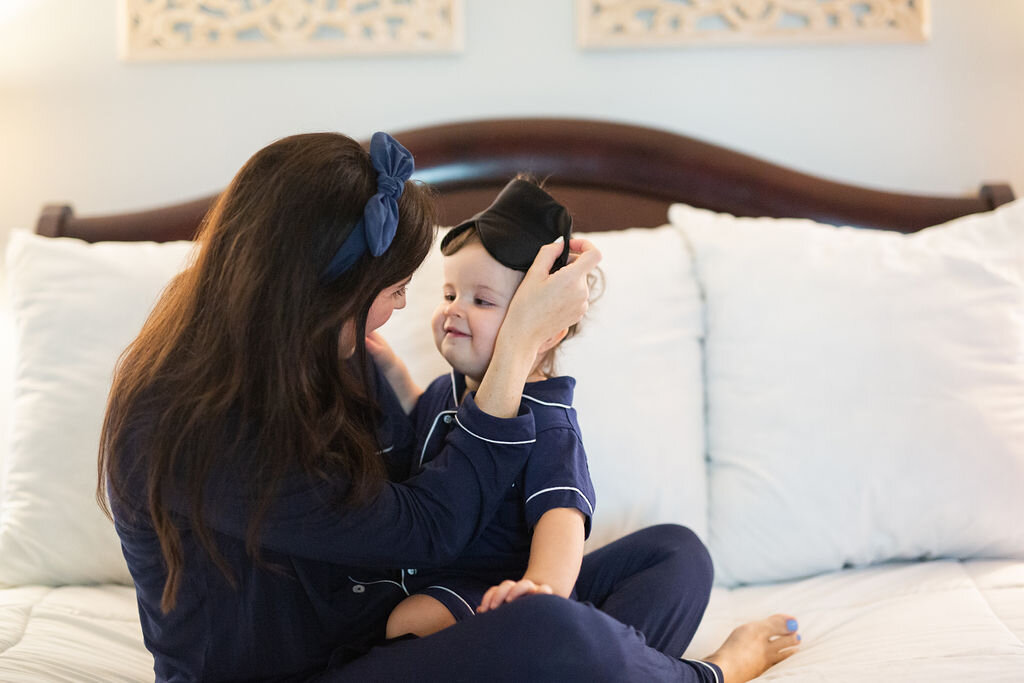
And if you’re listening and have a newborn or other little one at home with a tough sleep schedule – I’m sending you a hug. Remember that this is just a season, and it won’t last forever.

I remember after having Camilla – I wondered if I’d ever feel rested again in my entire life, or if this is just the new normal. Fortunately, she found a good sleep schedule and those nights with multiple wake-ups are few and far between. And now I get to start all over again in March with Kornick little one number two arrives.
Hmmm…. I should probably start stocking up on BeautyCounter Eye Revive Cooling Masks now…
And there are probably a whole host of other things you could do the night before to set yourself up for a good morning – regardless of whether you’re a morning lark, a night owl or a third bird.
You could find a morning accountability partner. You could use a Habit Tracker like the one I shared in Episode 40. The possibilities are endless – and with your positive self-talk – you’ll be able to see the opportunities more clearly as they present themself.
Ready for your Earbuds! – Listen to Episode 40: These 7 Habits Could Change Your Life
FINAL RECAP
-
Start by figuring out your biological chronotype. If you’re still not sure or you want to double check – Download the Bird is the Word worksheet and find out if you’re a morning lark, a night owl or a third bird.
-
Then – Know your Why – If you don’t have a compelling reason for being a better morning person, you’re not going to take action.
-
Next – Flip the script on the negative self talk. Make mornings a part of your identity and you’ll find ways to follow through.
-
And finally – set yourself up for success by starting your good morning the night before.
LISTENER SPOTLIGHT
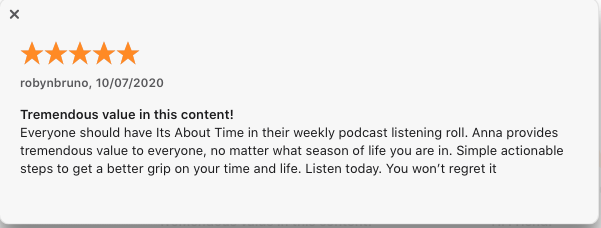
Well RobynBruno – Thank you so much for such a kind review! I’m so happy to hear that It’s About Time’s episodes and guests have been giving you so much value, and I’m grateful that the show is having such an impact on your time and your life. It means the world that you’d take the time to write me a review! Thank you so much for listening and for subscribing.
SUBSCRIBE & REVIEW IN ITUNES
If you’re enjoying It’s About Time so far, I hope you’ll take a moment to subscribe if you haven’t yet – I don’t want you to miss an episode! I’ve got a few bonus episodes in the works, and you might miss them if you’re not subscribed. Click here to subscribe on iTunes.
If really like what you hear, I’d be so grateful if you left me a review over on iTunes, too. Your review play a HUGE role in helping others find out about It’s About Time. And honestly, they’re really fun for me to read! Click here to review, select “Ratings and Reviews” and “Write a Review” and let me know what you’re loving about It’s About Time. Thank you!!
LINKS & RESOURCES MENTIONED IN THIS EPISODE
DOWNLOAD
READ
LISTEN
SLEEP
JOIN
-
Join the It’s About Time Academy!


Be the first to comment